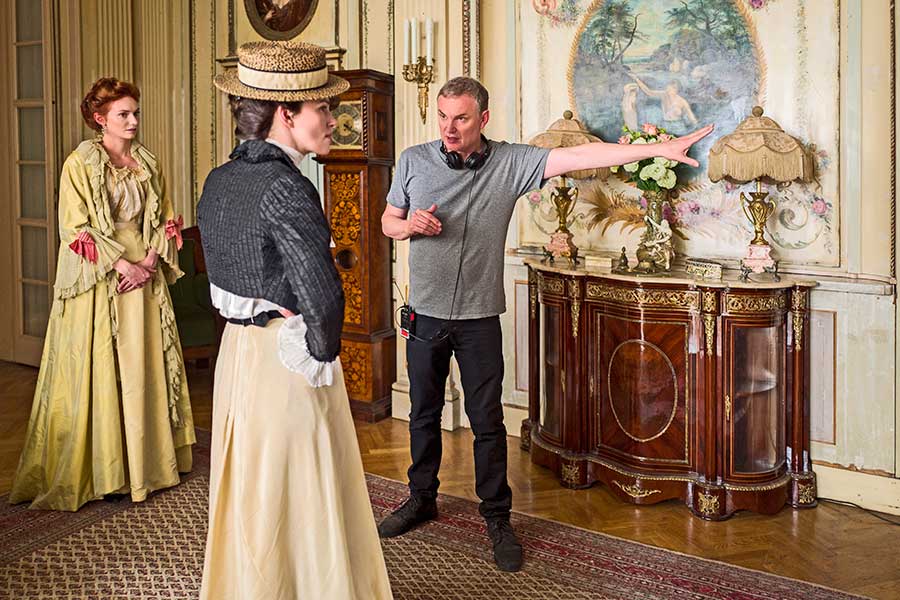“Colette” is a handsomely mounted and engaging biopic of “the most celebrated female author in the history of French literature.”
The film, which opens Oct. 5 in Philadelphia, recounts French country girl Sidonie-Gabrielle Collete (Kiera Knightley) marrying writer and publisher Henry Gauthier-Villars, known as Willy (Dominic West). Their relationship is rocky. He is a philanderer, and the couple frequently teeters on the edge of bankruptcy.
However, when Willy encourages his wife to write, she produces stories from her childhood about a character named Claudine that eventually becomes the toast of Parisian society. But the books are published under Willy’s name, not her pen name, Colette. As she becomes more independent, taking on female lovers — including Georgie Raoul-Duval (Eleanor Tomlinson), a Louisiana transplant, and Missy (Denise Gough), a woman of nobility who dresses as a man — Colette fights to make her name and work known.
The film was directed by Wash Westmoreland and cowritten with his late husband, Richard Glatzer, and Rebecca D. Lenkiewicz. Westmoreland told PGN that after the success of their 2014 film, “Still Alice” — which won Julianne Moore a Best Actress Oscar — the couple could do almost any project they wanted.
When Westmoreland asked his husband about their πnext project, Glatzer, who died from ALS in 2015, typed the word “Colette” into an iPad with his big toe. Glatzer had written the script back in 2001 in 10 days, and had subsequently rewritten it “20 or 30 times over the last 16 years,” according to his partner. Westmoreland said he was happy “after coming out of the darkest time of grief to make something for Richard, continue his legacy and get his name up on the big screen.”
“Colette” is a film about identity and belonging. The title character finds her place in the world through challenging it.
“I’m not interested in making a hagiography,” Westmoreland said. “Colette was a complex, interesting character. She had an egotism which drove her to break new ground, but she had tremendous self-involvement too. She was a feminist — but wouldn’t claim the rights of that. She didn’t see social contexts — e.g., class — but rather, in her own life, she did not allow the social restrictions around her gender to stop her from doing what she wanted. Her activism was more individual that societal.”
Colette remains an inspiration for the current age, the director said. “She had no guilt with her sex. Whatever felt natural was a feeling Colette had that overrode the moral rules of the time around sex and sexuality.”
Colette has three mentors in the film. Her mother, Sido (out actress Fiona Shaw), who was an early feminist, is her “bedrock,” according to Westmoreland. Sido imbued her daughter with a keen sense of self. Willy, her husband, recognizes Colette’s specialness and develops it, but he also exploits it in the ways that men with power can. Her third mentor is Missy, who, Westmoreland explained, “is very supportive of Colette’s talent and creativity in a giving and loving way. She’s a character who is in touch with her authentic self.”
Westmoreland makes it a point in his work to “break the conventional rules of the genre and show things in a less-conventional light.” The filmmaker did this in his 2006 Sundance award-winning film “Quinceañera,” about gentrification, class and racial differences in the gay community. He even did this in his early career as an adult filmmaker with “The Hole,” but that’s another story.
“Colette” breaks tradition in several ways. Westmoreland uses a fluid camera, which allows Colette to “control” the story and drive the narrative by just entering a salon in Paris. The filmmaker shifts from the atmosphere of the time into revealing Colette’s attitudes and personal relationships in a single camera movement.
He also emphasizes the LGBTQ elements in the story to show how Colette’s liberation came through her affairs with two women: the feminine Georgie and the masculine Missy. Colette’s story was about “modern sexuality and gender coming into focus,” Westmoreland said.
“Colette was the first to write about a woman’s sexual pleasure with honesty. She wrote about a queer milieu around the turn of the century, so the seeds of sexual identity were in that time at the beginning of the modern age.”
The filmmaker, who grew up gay in the north of England, acknowledged that he is drawn to stories about “underdogs who have to break some barriers.” Colette had the bravery and courage to push through and do extraordinary things, he added.
“That’s a good example for anyone. Don’t let anything get in your way of your dreams. Her imagination and tenacity are something we can learn from. She did things 100 years ago that still shock people today.”
